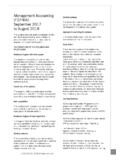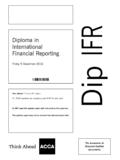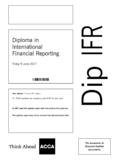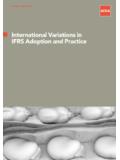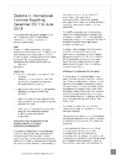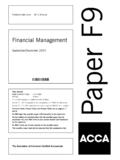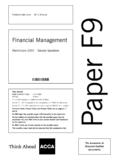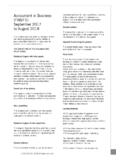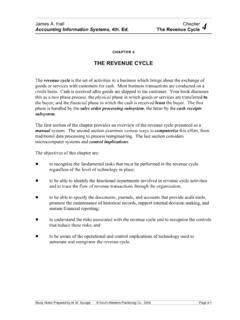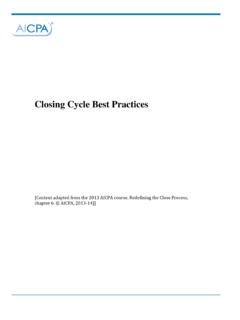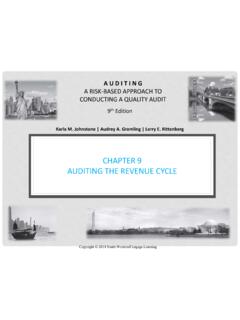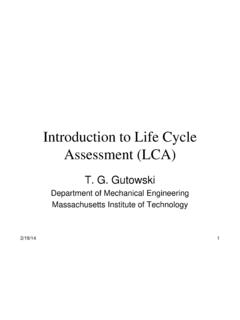Transcription of Management Accounting (MA/FMA) - ACCA Global
1 ACCA 2019-2020 All rights (MA/FMA)Syllabus and study guideSeptember 2019 to August 2020 ACCA 2019-2020 All rights OF hours and educational to ACCA examination to ACCA examination assessmentMANAGEMENT Accounting diagram linking Management Accountingwith other aim of the to examining the syllabusMANAGEMENT Accounting STUDY study of changes to Management Accounting ACCA 2019-2020 All rights LEVELSACCA qualifications are designed to progressivelybroaden and deepen the knowledge and skillsdemonstrated by the student at a range of levelsthrough each , the study guides assess bothknowledge and skills.
2 Therefore a clear distinction isdrawn, within each subject area, between assessingknowledge and skills and in assessing theirapplication within an Accounting or businesscontext. The assessment of knowledge is denoted bya superscriptKand the assessment of skills isdenoted by the HOURS AND EDUCATIONALRECOGNITIONAs a member of the International Federation ofAccountants, ACCA seeks to enhance the educationrecognition of its qualification on both national andinternational education frameworks, and witheducational authorities and partners globally. Indoing so, ACCA aims to ensure that its qualificationsare recognized and valued by governments,regulatory authorities and employers across allsectors.
3 To this end, ACCA qualifications arecurrently recognized on the education frameworks inseveral countries. Please refer to your nationaleducation framework regulator for furtherinformation about TO ACCA EXAMINATION STRUCTUREAND DELIVERY MODEThe structure of examinations Foundations examinations contain 100%compulsory questions to encourage candidates tostudy across the breadth of each Foundations examinations are assessed by two-hour computer based pass mark for all FIA examinations is 50%. TO ACCA EXAMINATIONASSESSMENTACCA reserves the right to examine anythingcontained within any study guide within anyexamination session.
4 This includes knowledge,techniques, principles, theories, and concepts specified financial Accounting , audit and taxexaminations, except where indicated otherwise,ACCA will publishexaminable documentsonce ayear to indicate exactly what regulations andlegislation could potentially be assessed withinidentified examination this examination regulationissuedor legislationpassedon or before 31stAugust annually, will beassessed from September 1stof the following year toAugust 31stof the year after. Please refer to theexaminable documents for the exam (whererelevant) for further issued or legislation passed inaccordance with the above dates may beexaminable even if theeffectivedate is in the term issued or passed relates to whenregulation or legislation has been formally term effective relates to when regulation orlegislation must be applied to entity transactionsand business study guide offers more detailed guidance onthe depth and level at which the examinabledocuments will be examined.
5 The study guideshould therefore be read in conjunction with theexaminable documents list. ACCA 2019-2020 All rights STRUCTUREThe qualification structure requires candidates who wish to be awarded the ACCA Diploma in Accounting andBusiness (RQF Level 4) to pass the Accountant in Business (AB)/(FAB), Management Accounting (MA)/(FMA)and the Financial Accounting (FA)/(FFA) examinations and successfully complete the Foundations inProfessionalism (FiP) DIAGRAM LINKING Management Accounting WITH OTHER EXAMSThe Foundations Level suite of qualifications is designed so that a student can progress through three discretelevels; RQF Level 2, 3, and 4.
6 Students are recommended to enter Foundations Level at the level which is mostappropriate to their needs and to take examinations in order, but this is not a mandatory requirement ACCA 2019 2020 All rights AIM OF THE SYLLABUSTo develop knowledge and understanding ofmanagement Accounting techniques to supportmanagement in planning, controlling and monitoringperformance in a variety of business syllabus for Management Accounting (MA)/(FMA), introduces candidates to elements ofmanagement Accounting which are used to makeand support syllabus starts by introducing the nature, thesource and purpose of Management informationfollowed by the statistical techniques used toanalyse data.
7 Then the syllabus addresses costaccounting and the costing techniques used inbusiness which are essential for any syllabus then looks at the preparation and useof budgeting and standard costing and varianceanalysis as essential tools for planning andcontrolling business activities. The syllabusconcludes with an introduction to measuring andmonitoring the performance of an organisation ACCA 2019 2020 All rights CAPABILITIESOn successful completion of this exam, candidates should be able to:AExplain the nature, source and purpose of Management informationBExplain and analyse data analysis and statistical techniquesCExplain and apply cost Accounting techniquesDPrepare budgets for planning and controlECompare actual costs with standard costs and analyse any variancesFExplain and apply performance measurements and monitor business performance.
8 ACCA 2019 2020 All rights TO EXAMINING THE SYLLABUSThe syllabus is assessed by two hour computer-based examination. Questions will assess all parts ofthe syllabus and will test knowledge and somecomprehension or application of this examination will consist of two A will contain 35 two mark objective testquestions (OTs). Section B will contain 3 ten markmulti-task questions (MTQs) each of which willexamine Budgeting, Standard costing andPerformance measurement sections of the : Budgeting MTQs in Section B can also includetasks from B2 Forecasting techniques. B4 Spreadsheets could be included in any of the MTQs,as either the basis for presenting information in thequestion scenario or as a task within the SYLLABUSAThe nature, source and purpose ofmanagement for of informationBData analysis and statistical and analysing Accounting for material.
9 Labour and and marginal Accounting cost Accounting and purpose of budgeting and discounted cash control and aspects of budgetingEStandard costing1 Standard costing calculations and of budgeted and actual profitFPerformance measurement - overview2 Performance measurement - application3 Cost reductions and value performance and reporting ACCA 2019 2020 All rights STUDY GUIDEATHE NATURE, SOURCE AND PURPOSE OFMANAGEMENT for managementa)Describe the purpose and role of cost andmanagement Accounting within anorganisation.[K]b)Compare and contrast financialaccounting with cost and managementaccounting.
10 [K]c)Outline the managerial processes of planning,decision making and control.[K]d)Explain the difference between strategic,tactical and operational planning.[K]e)Distinguish between data andinformation.[K]f)Identify and explain the attributes of goodinformation.[K]g)Explain the limitations of managementinformation in providing guidance formanagerial decision-making.[K] of dataa)Describe sources of information from withinand outside the organisation (includinggovernment statistics, financial press,professional or trade associations, quotationsand price list.[K]b)Explain the uses and limitations of publishedinformation/data (including information fromthe internet).
